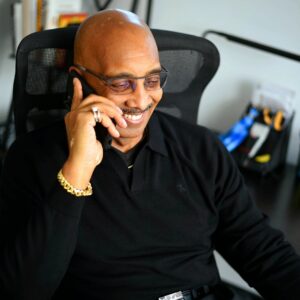
The Sacred Science of Becoming:
Where Spirituality, Coaching, and Positive Psychology Intersect
by Dr. D Ivan Young, MCC, NBC-HWC
Are you thriving in public—but unraveling in private?
You’re not alone. Behind the degrees, titles, and carefully curated success, countless professionals—especially coaches, clinicians, and high achievers—grapple with something much deeper. Indeed, something that’s hard to name but impossible to ignore.
Often, it isn’t just burnout, nor is it simply being overwhelmed. Instead, what if it’s something quieter? Just maybe it could be something sacred. Could it perhaps be a soul-level disconnection from who you truly are? Or, alternatively, maybe this is where spirituality, coaching and Positive Psychology intersect.
When Success Leaves You Spiritually Empty
You’ve worked hard, tried the therapy route, taken the necessary courses, and earned the respect of your peers. Yet, when the applause fades and the calendar clears, there’s a gnawing sense that something’s missing.
You’ve outgrown the version of yourself that got you here. But you’re unsure how to evolve without breaking everything you’ve built. That feeling is not uncommon—it’s simply not often discussed.
In a world that glorifies constant output, the internal erosion of purpose, identity, and peace goes unnoticed… until it doesn’t. And when it finally surfaces, it often looks like:
-
Emotional exhaustion masked as high-functioning professionalism
-
Constant mental chatter despite outward calm
-
Resentment toward the very responsibilities you once prayed for
-
Lastly, a haunting question: Is this all there is?
These are not mindset issues. They’re signs. Lets call them sacred nudges calling you back into alignment.
The Pain We Don’t Post About
Let’s speak the truth.
Many coaches, therapists, and high-net-worth professionals are suffering in silence. We’ve been taught to perform healing, not embody it.
We know the frameworks. We use the language. But when it comes to our own inner truth, we often bypass it in the name of “being strong.”
But here’s the thing: strength without alignment is a liability. It keeps you productive—but not present. Successful—but not fulfilled. Put mildly, you know what you’re living is a lie.
There’s an epidemic in our industries. And no, it’s not burnout.
It’s spiritual self-abandonment.
This Isn’t About Religion. It’s About Sacred Alignment.
Let’s clear something up. When I talk about spirituality, I’m not speaking of religion. Rather, I’m speaking of sacred self-awareness.
Essentially, spirituality, in coaching, is about reconnecting with the truth of who you are beneath the roles you play. Moreover, it’s the process of reclaiming the parts of yourself that got silenced by success and distorted by performance culture.
Spiritual alignment, therefore, is not a nice-to-have. Indeed, for many of us, it’s the only path forward. Fundamentally, this is where spirituality, coaching and Positive Psychology intersect.
Furthermore, this concept finds support in research. According to the “Department of Business Management, Central University of Technology, South Africa” (excerpt from “Workplace spirituality, work engagement and thriving at work” by Freda van der Walt), workplace spirituality is increasingly recognized as essential to leadership effectiveness, decision-making, and well-being—particularly in high-stress environments (Giacalone & Jurkiewicz, 2010).
Consequently, the most effective leaders, coaches, and clinicians today aren’t just intelligent, they’re integrated. In other words, they operate from a place of internal coherence. Ultimately, that’s what this work is about. Put mildly, you’re here for a reason that goes beyond your company and job title. You’re here for a divine purpose.
Positive Psychology Isn’t Just About Being Happy
Positive Psychology has revolutionized the way we understand human flourishing. It shifts the focus from dysfunction to strength, from illness to wellness.
But let’s be honest, left on its own, Positive Psychology can sometimes feel… incomplete.
Why? Because it often stops at behavior.
It asks: What can you do more of to feel better?
But if you’re spiritually disconnected, those practices can become more performance tools. Gratitude journals, affirmations, and vision boards become strategies—not soul work.
What’s missing is the why beneath the behavior. That’s where spirituality enters.
Where the Sacred Meets the Scientific
When we blend Positive Psychology with spiritually-rooted coaching, the results go deeper. We tap into what I call “the why.”
Instead of simply helping clients become more productive, we help them become more present.
Beyond making an attempt at “fixing” behaviors, we investigate the beliefs that drive them.
Rather than chase clarity, we cultivate are postitioned to guide our client’s toward congruence—a felt sense of alignment between the head, the heart, and the soul.
In my work, I’ve had the privilege of seeing this approach make a real difference in people’s lives – from high-stakes environments like boardrooms and hospitals, to public platforms like TEDx, and into those quiet, deeply personal moments of self-discovery. It’s, naturally, influenced how I approach becoming a better coach, too. But beyond that, I’ve embraced this in my own journey. I’m living proof “really,” of how looking at self-awareness from multiple angles can absolutely transform your life.
Here’s how we do it:
Core Practices That Drive Deep Transformation
1. Somatic Spiritual Awareness
You can’t think your way into peace. You have to feel your way into presence.
That’s why we start with the body.
Using breathwork, stillness, and body-based inquiry, we help clients locate their truth not just in their mind—but in their nervous system. Their body becomes the sacred space where trauma, insight, and intuition live.
As Psychology Today notes, integrating somatic awareness into spiritual work reduces anxiety, reconnects individuals with their inner compass, and fosters regulation (Dana, 2021).
When clients finally pause and ask, “What is my body trying to tell me?”—the answers are life-changing.
2. Strengths With Shadow Consciousness
Positive Psychology is famous for its strengths-based approach. But we can’t ignore the shadow side of those strengths.
- Is your empathy driven by love—or a fear of rejection?
- Is your leadership style empowering—or rooted in control?
- Are you helping others to serve—or to stay needed?
Shadow work allows clients to examine the egoic distortions behind their strengths. It’s not about shame—it’s about clarity.
Competent coaches lovingly bring these blind spots into the light, not to diminish you—but to refine you.
This work creates leaders and healers who are emotionally intelligent, not just emotionally fluent.
3. Sacred Inquiry and Inner Stillness
Not all breakthroughs come from action. Some come from brave questions—and the silence that follows.
We guide clients through deep inquiry:
- Who am I when I’m not performing?
- What am I numbing with success?
- Where am I sacrificing authenticity for admiration?
These questions can’t be answered in a rush. They unfold slowly—often painfully—but always powerfully.
They shift the entire foundation on which a client builds their next chapter.
Who This Work Is For
Let’s be real. Your clients can feel it when you’re aligned—and when you’re not.
That’s why doing your inner work is the greatest professional development you’ll ever invest in.
The research backs this up.
According to the International Journal of Wellbeing, integrating spiritual development into coaching leads to improved satisfaction, stronger relationships, and greater emotional regulation (van Dierendonck & Mohan, 2006).
But more importantly, it changes the way you love, lead, and live.
You Can’t Lead What You Haven’t Lived
If you’re a coach, clinician, or leader, and you’ve sensed a quiet misalignment growing beneath your success—you’re not broken. You’re awakening.
This work is for:
- Coaches feeling emotionally depleted from holding space for others
- Healthcare providers navigating compassion fatigue and spiritual stagnation
- Executives who’ve hit their goals but lost their sense of purpose
- High Net Worth professionals who appear successful but feel spiritually bankrupt
The answer isn’t another strategy. It’s about the radical shift into soul-level stillness.
The path forward isn’t learning more. It’s remembering the essence of who you truly are.
This Is Not Woo-Woo—It’s Wisdom
Our culture celebrates hustle, results, and performance. But the truth is—none of that matters if it comes at the cost of your peace.
And no, you don’t have to choose between success and spirituality. You can have both.
You can be grounded and grand. Soft and strong. Still and successful.
The new model of leadership isn’t built on dominance—it’s built on depth.
And that depth begins with you.
Final Thoughts: This Is Sacred Work
This moment may be your invitation to stop striving and start surrendering.
This a good time to finally ask yourself the questions you’ve been too busy—or too afraid—to answer.
Who are you becoming?
What have you been avoiding?
What would it look like to live from truth—not just tools?
At the intersection of spirituality, coaching, and Positive Psychology lies the sacred science of becoming.
You’re not here to just do more. You’re here to become more of who you truly are.
And that’s not a marketing pitch. That’s a soul calling.
References
- Giacalone, R.A., & Jurkiewicz, C.L. (2010). The Science of Workplace Spirituality. Harvard Business Review.
- Dana, D. (2021). Polyvagal Theory in Therapy: Engaging the Rhythm of Regulation. Psychology Today.
- van Dierendonck, D., & Mohan, K. (2006). Some thoughts on spirituality and eudaimonic well-being. International Journal of Wellbeing.
.

Dr. D. Ivan Young, MCC, brings a wealth of expertise in Behavioral Neuroscience and relationships to his work. A globally recognized figure, he has shared his knowledge as a three-time TEDx speaker (with over 4.9 million views) and through numerous high-level coaching certifications. These include ICF Master Certified Coach (MCC), National Board Certified Health and Wellness Coach, and Certified Professional Diversity Coach. Holding a Ph.D. in Holistic Life Coaching and certification as a Master MBTI Practitioner, Dr. Young is also a member of the Forbes Coaches Council and a distinguished Professional Fellow at the Institute of Coaching McLean (affiliated with Harvard Medical School).
